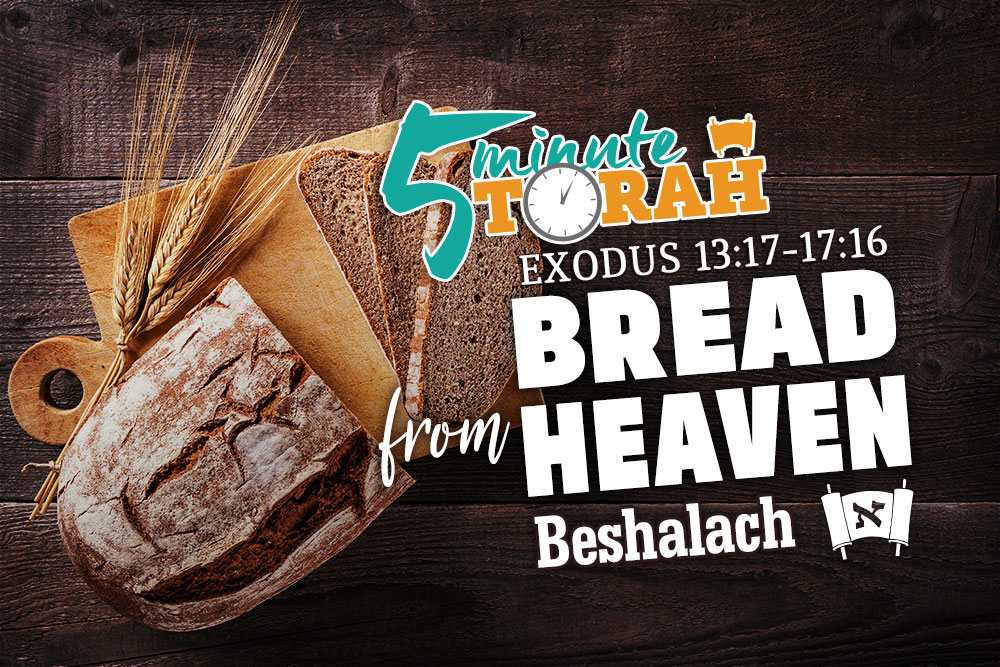Bread From Heaven
Series:

Parashat Beshalach
(Exodus 13:17-17:16)
What is it? This is what the Children of Israel asked when they saw the manna when it first appeared in the wilderness. Before it appeared they had been grumbling against Moses and Aaron because their bellies craved more than what they had at the time. They were so dissatisfied that they spoke about their time of slavery in Egypt as if it brought back nostalgic memories for them saying, “We sat by the meat pots and ate bread to the full” (Exodus 16:3). Hashem heard their grumbling and told them He was going to put an end to it. He would give them quail in the evenings and manna in the mornings. They would have no more reason to complain.
The LORD told Moses, “Behold, I am about to rain bread from heaven for you, and the people shall go out and gather a day's portion every day” (Exodus 16:4). He calls the manna “bread from heaven.” What does this phrase mean and why is it used? First, throughout the Scriptures the word bread is used as a general word for food. In this context it simply means that the food Hashem is going to provide for them is going to be unlike any food they have ever eaten. It will be something miraculous and of a divine nature. How so?
Our sages tell us that the manna was completely unparalleled in that it was uniquely tailored to each individual. No matter the size or the need of the person they gathered exactly enough and exactly what they needed. It provided not only what that person needed, but also what he desired. To one it would taste this way and to another it would taste that. This is based on the passage in our portion that says:
They gathered, some more, some less. But when they measured it with an omer, whoever gathered much had nothing left over, and whoever gathered little had no lack. (Exodus 16:17–18)
Our sages tell us that this miracle of manna was designed to teach the Children of Israel the value of Hashem’s Word. Physical bread can only satiate so much, but the bread of God’s Word brings complete satisfaction. We find an echo of this in the Gospels when Yeshua multiplies the loaves and fish. Twice Yeshua feeds a crowd comprised of thousands of individuals with just a few loaves of bread. But the lesson he wanted his disciples to understand had nothing to do with the physical food they were consuming:
You of little faith, why are you talking among yourselves about having no bread? Do you still not understand? Don’t you remember the five loaves for the five thousand, and how many basketfuls you gathered? Or the seven loaves for the four thousand, and how many basketfuls you gathered? How is it you don’t understand that I was not talking to you about bread? (Matthew 16:8–11)
Yeshua is the prophet like Moses as described in Deuteronomy 18:15–22. His multiplication of bread for the multitudes was to show his connection to Moses. Jewish expectation says that just as Moses had brought down bread from heaven, so would the Messiah. But something exceptional took place after Yeshua fed the multitudes. At each of these miracles he had his disciples collect the leftovers of bread from the crowd. In each instance the leftovers were many times more than the original substance. Why is this?
Commenting on the miracle of manna from our Torah portion, Malbim, a nineteenth century rabbinic commentator from the Ukraine, suggests that the lesson of the manna was to teach the Israelites a spiritual lesson. Bread is normally made from a grain such as wheat or barley that needs to be threshed and winnowed before the grains are available for grinding into flour and ultimately used to make the bread. Unlike bread, however, manna was not made from grain. Therefore, there is nothing wasted from it. It is totally used and absorbed into the body.
Many times we come to Torah or to Yeshua and we seek, study, and pray to receive a morsel from Heaven. But too often we think we have to thresh and winnow what we receive because it’s not what we think we need. We don’t need correction, or we don’t need this or that because we feel that we already know it. But by doing so we are actually discarding divine revelation and a vital component of our spiritual nourishment.
Although the manna given to the Children of Israel in the wilderness was miraculous and exactly what they needed, Yeshua is the true Bread from Heaven and can fulfill a person even more than the manna that sustained them in the wilderness. There is nothing leftover in him. When Yeshua gives us his manna we should consume it fully without wasting any of it. It is all that we seek and all that we need. But only for today. Tomorrow he calls to us to receive from him the Bread of Heaven once more. And so our lives should continue until we meet him face to face in his Kingdom.








